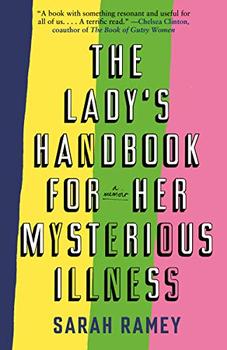Write your own review!
Nima
Reeks of Privilege - Not a Meaningful Contribution
My heart ached for Ms. Ramey, and I believe she was sick. I believe medical science is failing people like her. That said, ohmygosh, am I the only one that couldn't bear the obtusely privileged, sanctimonious, and self-aggrandizing tone of this book?
I didn't find her style witty, I found it imprudent and rambling. I was so excited to hear about her compendium of experiences from interviews with women who have mysterious illnesses, but it's all about her and it sounds like low self-esteem, personified! It was such a slog to finish.
She can't resist mentioning how her medical professionals are more famous and more respected or more cruel and indifferent, she and her crowd are higher achieving, her symptoms are more severe and perplexing, her decline more precipitous, her open mic night isn't your typical "anemic" open mic experience ... she's so dismissive of the experiences of others! It gave me a gross feeling in my gut, no pun intended!
She consults with the best doctors and demands antibiotics, she can assure you; she avails herself of her yogi, her EXPENSIVE (we get it, you said it several times) and RENOWNED acupuncturist, her parents' summer cottage in which she convalesces, and an antifungal script from her medical-practitioner mom (which, in a display of questionable ethics, mom didn't want her to discuss with her treating clinicians).
Ramey sounds as though she's simultaneously gaming and dissing the system. I don't believe she ever felt that eating well was nincompoopery, nor does medical science believe or promote this. Her own descriptions indicate she can sustain effort and attention when a subject piques her interest, the very antithesis of intractable fatigue. She regards and disregards science at whim. She uses terminology incorrectly, in spite of her extensive use of medical services; e.g., your labia are part of the vulva, not the vagina. She consumes medical resources, on an emergent basis, that reveal no pathology and could be directed toward true emergencies.
Worst of all, her cursory mention of discrimination of minorities in medicine toward the start of the book sounds gratuitous and dismissive, like a means to justify her feeling entitled to her privileged and disproportionately attentive medical treatment.
Her condition and pursuant lousy treatment by the medical industry is real, and for that I feel great empathy toward her. I don't think she sounds like a junkie, and she works when she is able. Her meandering course through "many" degrees, however, ultimately led her to write a confirmation bias filled creative writing treatment of a scientific topic that deserves rigor and reputable data and citations for her arguments. The minute a theory ceases to fit the picture she paints, she abandons it in favor of the next thing.
She descrbes person after person listening to her woes, bewildered, offering their best guesses (exercise, diet, therapy, behavior modification), which she accepts, then laments that her condition is a result of never having been listened to when she fails to maintain compliance. Later, she arrives on diet, exercise, and positivity as solutions, but takes sole credit for their discovery. As such, it reads like the journal of a whiny, spoiled girl in a self-imposed state of arrested development. I suspect the book is of comfort to sick persons in its ability to confirm their experience, its one redeeming quality.
Not everyone has the time or the resources or the parental support to take a years-long journey to "follow" their "bliss", attend to nothing but their health, retreat, take herbal antifungals, focus on yoga practice, cycle through endless pricey alternative treatments, pack up and move on a whim, shed their "demoralizing and confining" childhood home at will, wear Chanel lipstick (did she mention expensive?) and visit open mic nights while unemployed, "sleep on it" for three months, or even repeatedly demand satisfaction from their doctors until they get it.
Despite her relative fortune, she declares her problems of greater magnitude than others'. She never takes into account the experiences of scores of less fortunate women across the country with crappy jobs that support families, little to no health coverage, time-burglar husbands and children, and perhaps even parents that can scarcely care for themselves, much less provide a good standard of living for them and their disabled adult child on a permanent basis. The wheel with time to squeak gets the grease, here.
She sounds as though she thinks of, literally, nothing but herself for years and years, so she drones and drones about being vindicated on her half-baked theories, and about righting perceived slights from doctors, never presenting a balanced picture of her clinicians' differential data and diagnoses, or even the support for her own positions. Instead, she whines and whines, and she brags and brags.
I'm not even saying her premise is wrong or all her ideas are kooky. The story is just so given to flights of idea and gratuitous back-patting (Dr. Functional says only SHE answered the question about stress right! Click! Check!), that the solution, expensive tenacity, is a hard pill to swallow. I just would have been more interested in a book describing the experiences of the author and other people with mysterious illnesses, minus the name dropping and self-serving hyperbole and conjecture.
I suspect, were she to read my review, her privilege would say to her, "What does this woman know? She doesn't understand how hard it was for me. Privilege has nothing to do with it! I know I've saved at least one woman!" Perhaps, but I would challenge her to consider whether the woman she may have helped was probably white, privileged, or wealthy. Strikes me that very few others have the time and resources to follow the author's advice.
Regardless of all the foregoing, I was relieved to read that they finally found the anatomical cause of her distress. I hope she feels much better.

 Book Reviewed by:
Book Reviewed by:





